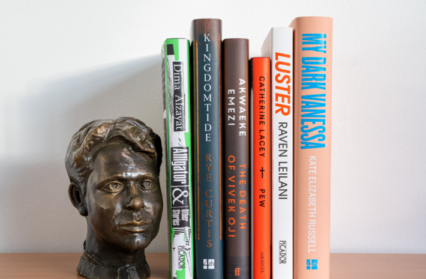Raven Leilani wins the 2021 International Dylan Thomas Prize for her debut novel Luster.
Raven Leilani has been announced as the winner of the £20,000 Swansea University Dylan Thomas Prize at the virtual award ceremony held this evening on the eve of International Dylan Thomas Day. The ceremony was hosted by award-winning actor, screenwriter and BAFTA winner Celyn Jones. In an opening speech Swansea University’s Vice-Chancellor, Paul Boyle, said that “in difficult times, we need art and artists more than ever.”
The winning title was picked from a shortlist of six “world-class” books – The Prize recognises the best published literary work in the English language. This year’s judging panel was chaired by award-winning writer, publisher and co-director of the Jaipur Literature Festival, Namita Gokhale, who worked with critically acclaimed writers Syima Aslam, Joshua Ferris, Francesca Rhydderch, and Stephen Sexton to pick the 2021 winner. Speaking of Luster, judge Gokhale said: “the jury unanimously decided on this riveting debut novel […] I congratulate Raven Leilani and all the shortlisted authors and wish them the very best on their writing journeys.”
First launched in 2006, The Prize – for writers aged 39 or under – is considered one of the most prestigious literary awards in the world and is administered by Swansea University. Last year’s winner was US author Bryan Washington who won with his debut short story collection, Lot.
The five other titles shortlisted for this year’s prize were:
Alligator and Other Stories by Dima Alzayat (Picador)
Kingdomtide by Rye Curtis (HarperCollins, 4th Estate)
The Death of Vivek Oji by Akwaeke Emezi (Faber)
Pew by Catherine Lacey (Granta)
My Dark Vanessa by Kate Elizabeth Russell (HarperCollins, 4th Estate)
You can watch the 2021 Swansea University Dylan Thomas Prize Award Ceremony here.
Read Next…
What Next? Cymru launches a social media campaign calling for a Culture Minister For Wales as a part of its Cultural Manifesto for Recovery.












